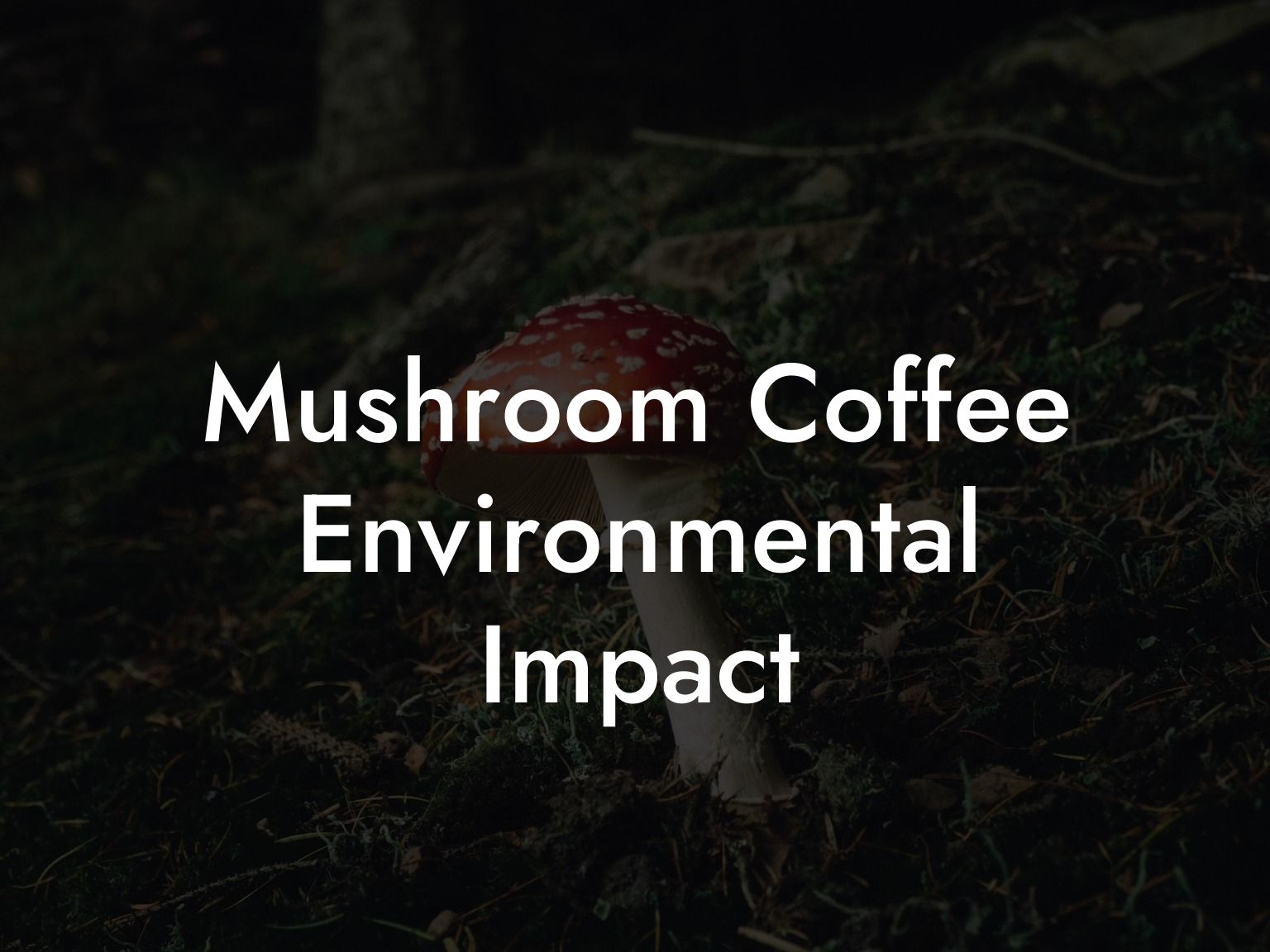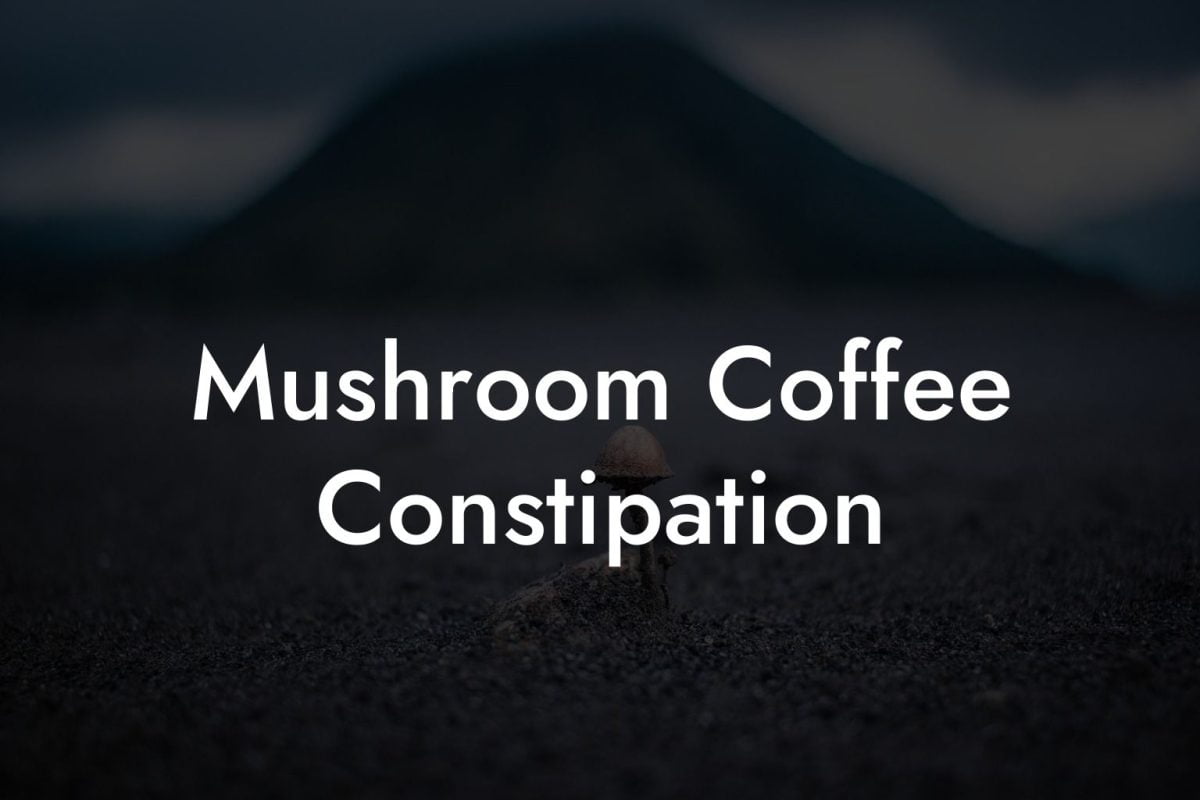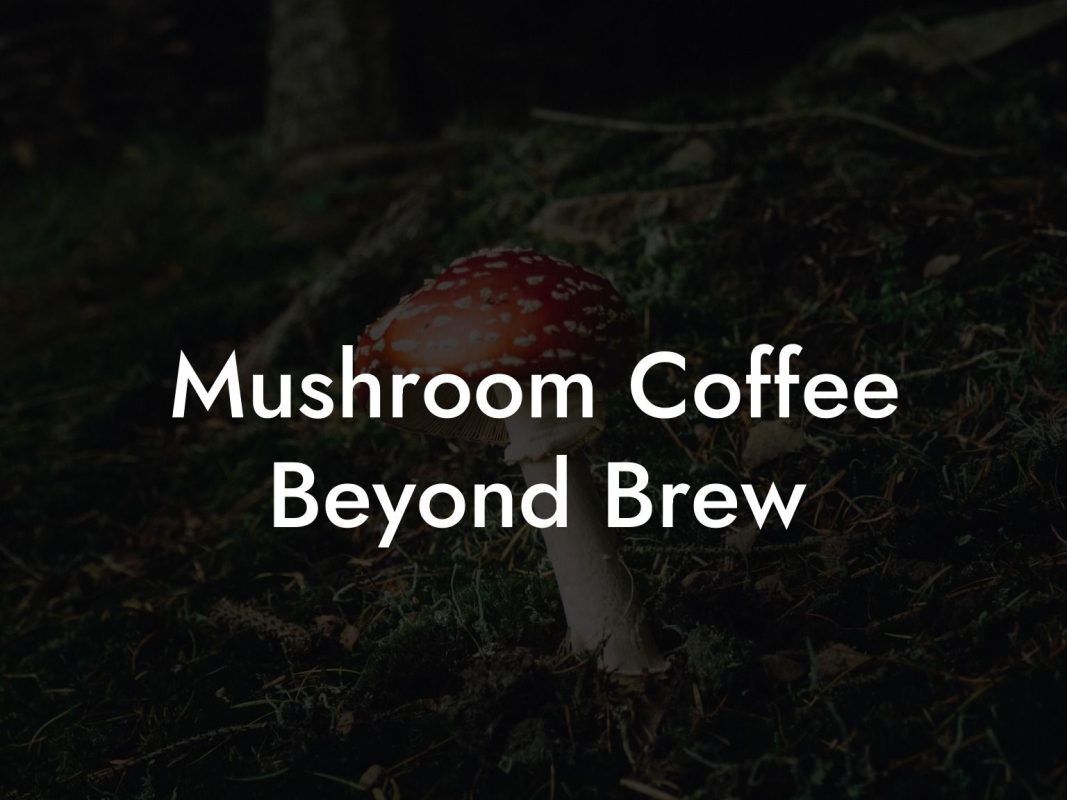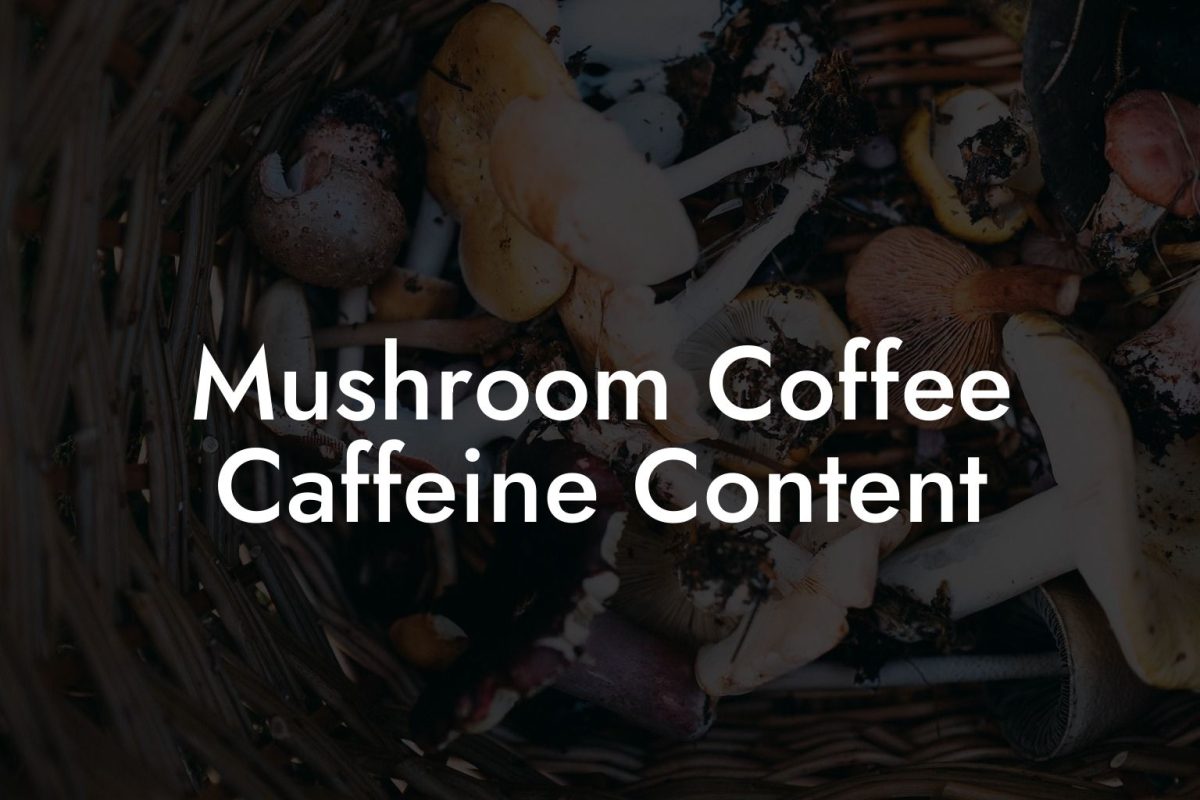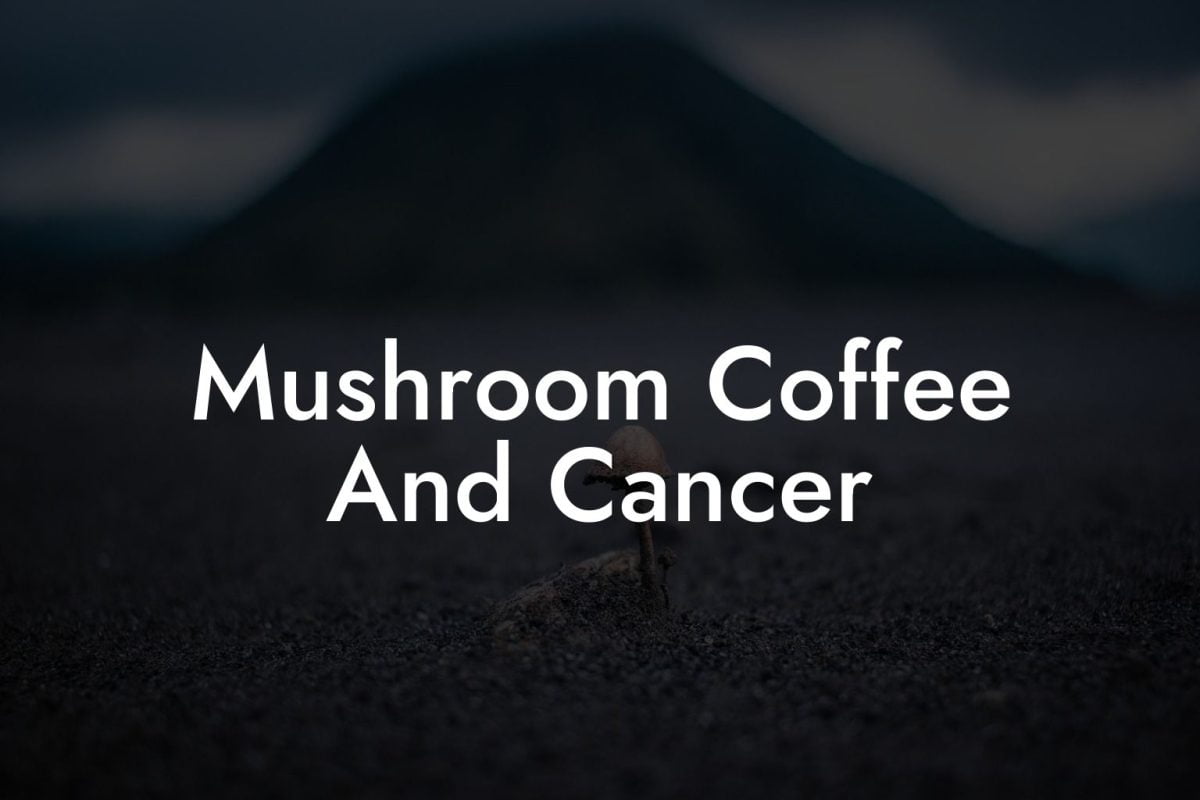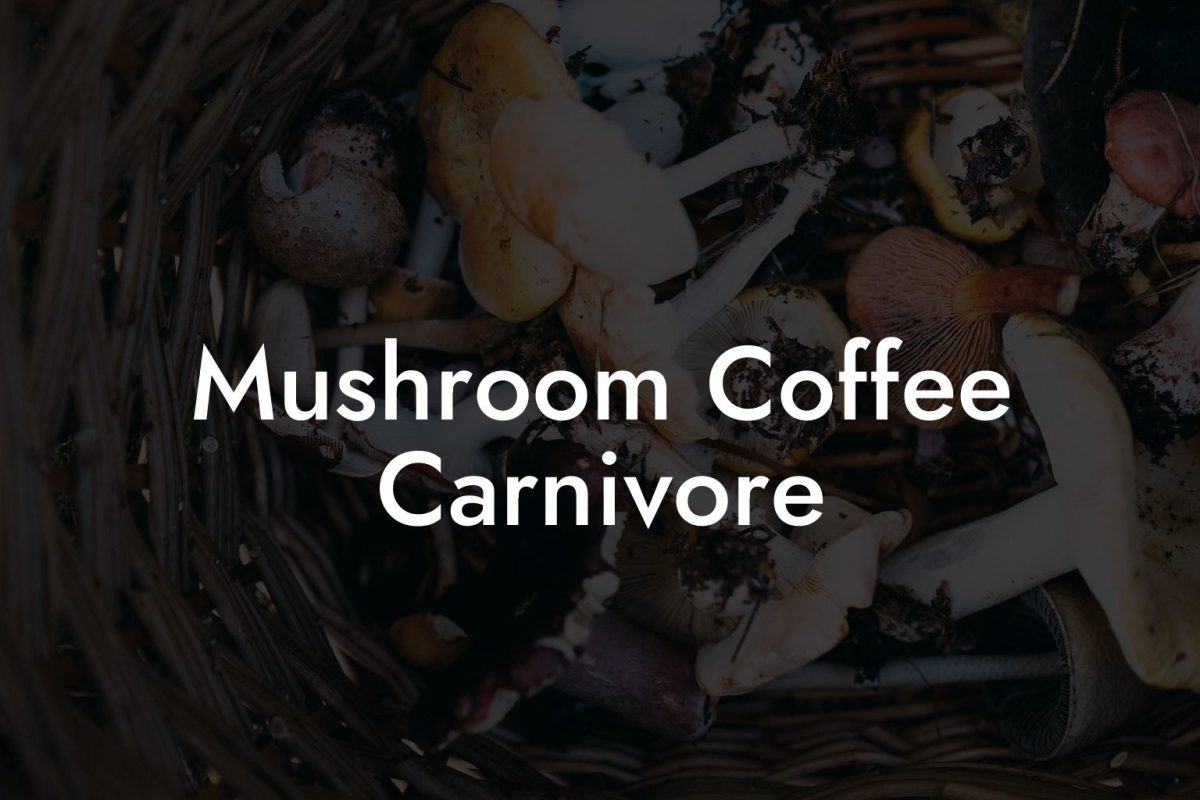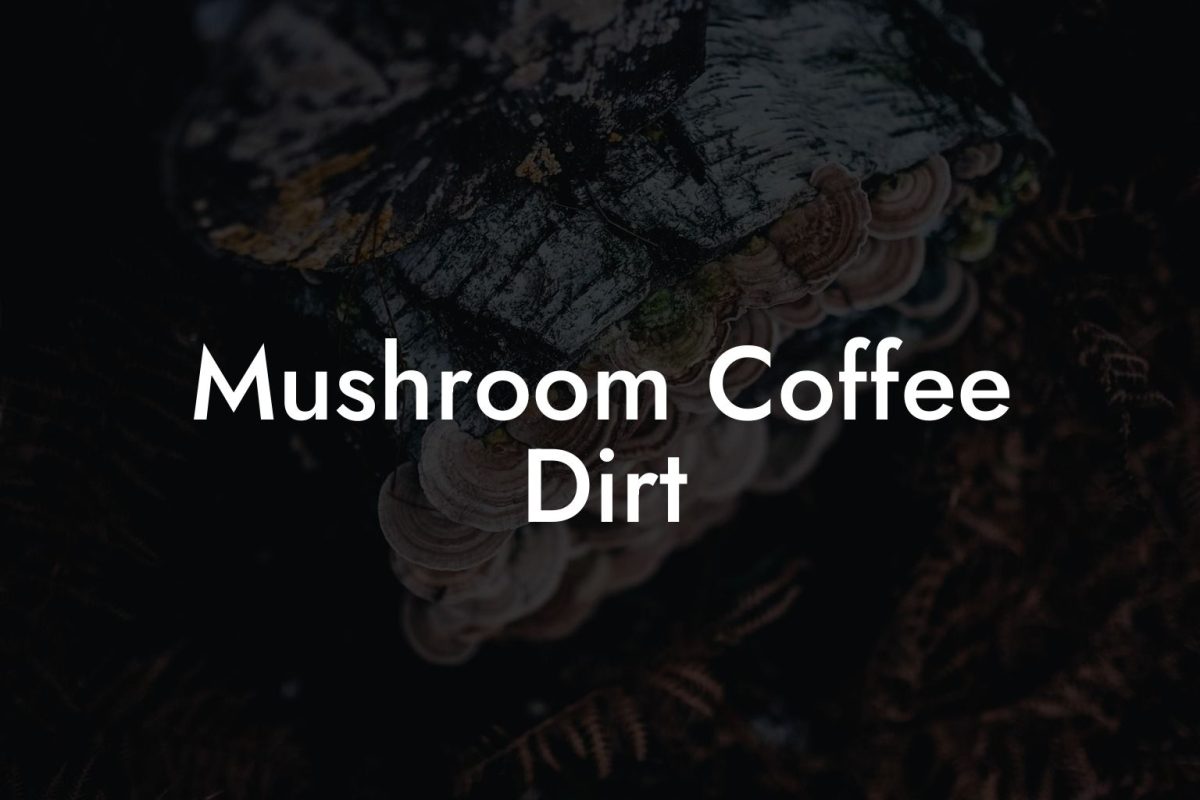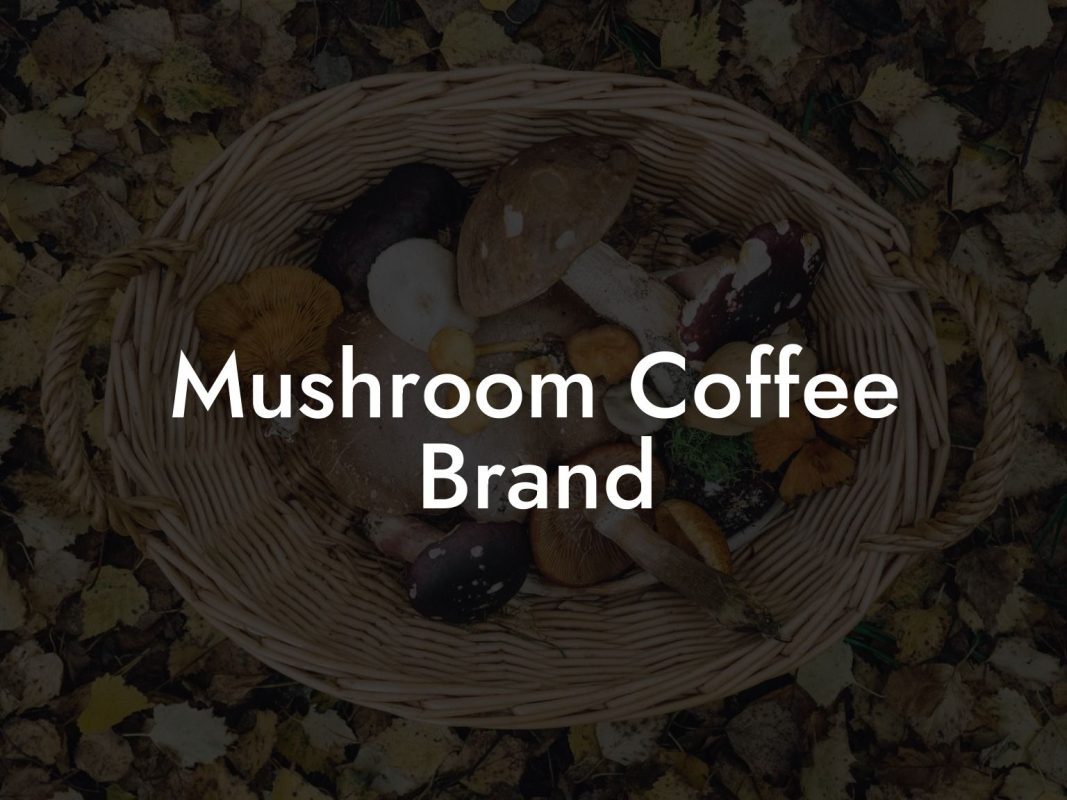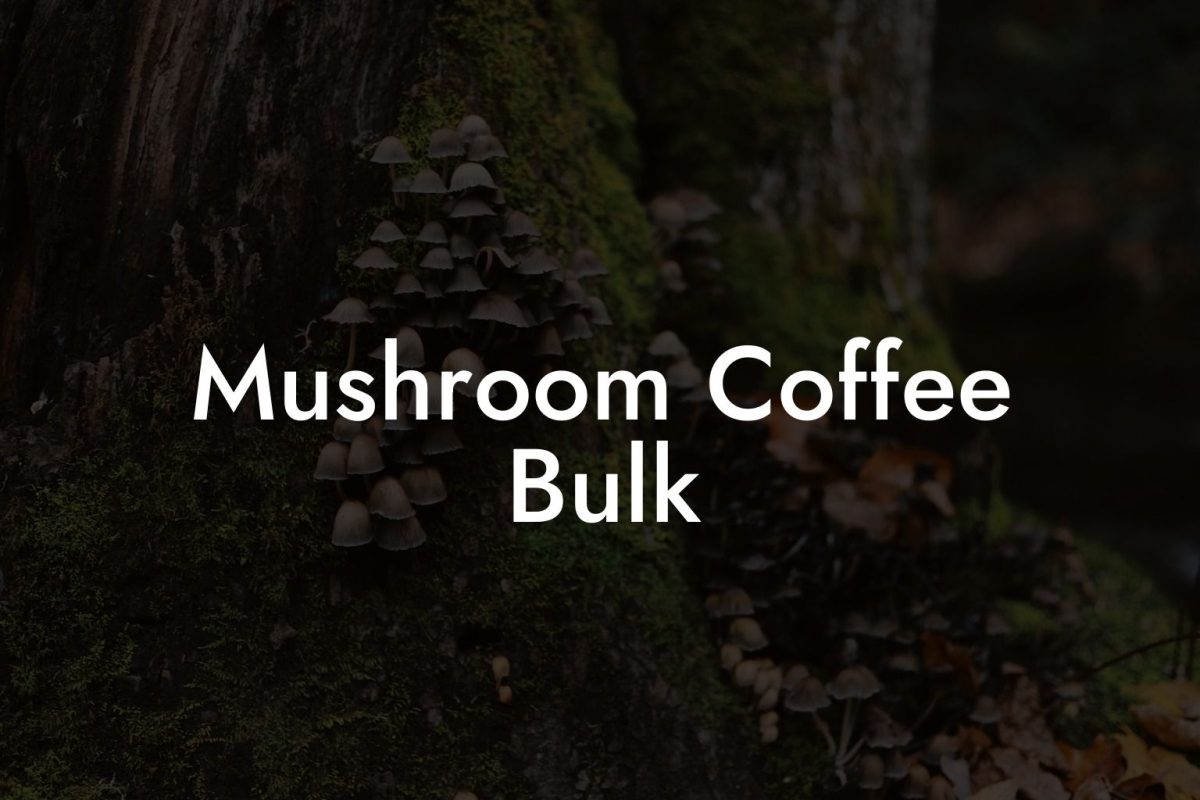Picture this: a beverage that not only kick-starts your morning with a zany twist but also gives Mother Earth a much-needed, eco-friendly high-five. Welcome to the fascinating universe of mushroom coffee, a brew that’s stirring up conversations not just about taste, but about its environmental impact. If you’ve ever wondered how swapping your regular cup of joe for a magical mushroom-infused alternative might help save the planet while still fueling your creativity, then buckle up. This deep dive into the environmental impact of mushroom coffee is here to spill the organic tea on sustainability, eco-friendly production, and why your caffeine fix might just be the green revolution you’ve been waiting for.
Quick Links to Useful Sections
- Understanding Mushroom Coffee: A Sip of Nature’s Future
- The Ecological Benefits of Mushroom Coffee
- Cultivation and Production: From Mycelium to Mug
- Life Cycle Assessment: Measuring the Sustainability of Mushroom Coffee
- 1. Raw Material Sourcing
- 2. Energy Consumption
- 3. Transportation and Distribution
- 4. Packaging and Waste Management
- Environmental Challenges and Opportunities in the Mushroom Coffee Industry
- 1. Scaling Up Production
- 2. Infrastructure and Investment
- 3. Consumer Education and Perception
- 4. Regulatory and Certification Hurdles
- Comparative Analysis: Mushroom Coffee vs. Traditional Coffee
- 1. Water Usage
- 2. Land Use and Biodiversity
- 3. Pesticide and Chemical Use
- 4. Carbon Footprint and Waste
- The Role of Organic Farming and Mycelium in Sustainable Cultivation
- Consumer Impact: How Your Choice Makes a Difference
- Resources and Community Support: Your Next Steps
- Mushroom Coffee and the Broader Sustainability Landscape
- Moving Forward: Innovating for a Greener Future
- Mushroom Coffee Environmental Impact FAQs: Your Eco-Queries Answered
- Your Path to a More Sustainable Brew
Understanding Mushroom Coffee: A Sip of Nature’s Future
Mushroom coffee is no ordinary brew, it’s a smart twist on traditional coffee that blends premium coffee beans with the natural goodness of medicinal mushrooms like lion’s mane, chaga, and reishi. But here’s the kicker: while it may taste delightfully earthy, its environmental impact is equally robust. As the world shifts its focus toward more sustainable options, mushroom coffee has emerged as a frontrunner in the battle against climate change. This unique beverage demands attention not just from our taste buds, but from our ideals too.
At its core, mushroom coffee is a blend of nature and innovation. The infusion of mushrooms isn’t merely for a hipster aesthetic, it has real, tangible benefits that ripple through our environment. From reducing water usage during cultivation to offering lower levels of pesticides and supporting organic farming practices, this beverage is making waves. And let’s not forget that many mushroom coffee brands are committed to fair and ethical sourcing practices, ensuring that the planet gets a breather with every sip.
Whether you’re a Gen-Z trailblazer or a millennial on the go, mushroom coffee represents more than a caffeine alternative; it’s a lifestyle choice that marries savvy consumption with planet-positive practices. So, as you hold that eco-friendly cup, know that you’re sipping on a beverage that stands as a beacon for environmental awareness in an increasingly woke world.
The Ecological Benefits of Mushroom Coffee
Let’s cut to the chase: mushroom coffee isn’t just a win for your health and energy, it also carries a hefty dose of ecological benefits. By opting for this sustainable blend, consumers and producers alike are taking strides toward reducing the carbon footprint of their morning rituals. Here are some of the top environmental boons of mushroom coffee:
Looking For The Best Mushroom Coffee? You'll Love These:
- Reduced Water Footprint: Unlike traditional coffee farming, which often guzzles precious water resources, mushroom cultivation typically requires far less water. This means a lower water footprint and a step toward preserving our dwindling freshwater reserves.
- Organic and Pesticide-Free Cultivation: Many mushroom coffee brands emphasize organic growing practices. The mushrooms used in these blends are generally grown without harmful pesticides and synthetic fertilizers, lessening the chemical load on our ecosystems.
- Eco-Friendly Production Methods: Sustainable production practices, such as using renewable energy sources and eco-conscious packaging, are becoming the norm in the mushroom coffee industry. These practices not only reduce energy consumption but also minimize waste.
- Support for Biodiversity: By fostering organic cultivation methods, mushroom coffee indirectly supports biodiversity. Healthy soil, thriving mycelium networks, and natural pest control all contribute to robust, resilient ecosystems.
- Lower Carbon Footprint: When you swap your regular coffee for a mushroom-infused alternative, you’re often choosing a product that’s produced closer to home using local supply chains, thereby mitigating the emissions associated with long-distance shipping.
These benefits combine to form a formidable environmental profile that sets mushroom coffee apart. Every cup represents a commitment to a greener, more sustainable future, one that goes beyond just a caffeine buzz.
Cultivation and Production: From Mycelium to Mug
Dive into the fascinating world behind the scenes, and you’ll discover that the production of mushroom coffee is a masterclass in sustainability. Unlike its conventional counterpart, the cultivation of mushrooms demands less intensive resource usage. The process typically begins with carefully controlled environments where organic substrates (think sawdust and agricultural byproducts) are transformed into nutrient-rich growth media for mushrooms.
This unconventional agricultural method significantly reduces the need for chemical fertilizers, and the resulting byproducts are often reintegrated back into the ecosystem, enhancing soil health and promoting a natural cycle of growth. For eco-conscious consumers, this represents a major shift from the heavily industrialized coffee farms that dominate much of the globe.
Moreover, mushroom farming leverages the natural recycling capabilities of fungi. Mushrooms thrive on organic waste, breaking down materials that would otherwise contribute to landfill mass. In other words, mushroom coffee is a champion of the circular economy, turning what some might deem “waste” into a source of life and flavor.
The production process often spotlights renewable energy sources (solar panels, wind, etc.) and minimal waste generation. Packaging, too, is undergoing a transformation, many brands now offer recyclable, compostable, or even reusable containers, ensuring that the environmental impact is minimized from farm to cup.
By prioritizing organic growth and innovative production techniques, mushroom coffee stands out as a truly eco-friendly product. It’s a real-life superhero in a cup, combining flavor, function, and environmental foregrounding in a way that leaves conventional coffee in the dust.
Life Cycle Assessment: Measuring the Sustainability of Mushroom Coffee
When it comes to assessing the environmental impact of any product, a holistic view is essential. Life cycle assessment (LCA) is a powerful tool that breaks down the total environmental load, from cultivation to production, distribution, consumption, and disposal. For mushroom coffee, several factors contribute to a favorable LCA outcome:
1. Raw Material Sourcing
The raw materials behind mushroom coffee are sustainably sourced. Many cultivators rely on organic substrates and recycled agricultural byproducts, reducing the pressure on virgin resources. Meanwhile, the coffee beans, when blended with mushrooms, are often ethically and locally sourced, further driving down the carbon footprint.
2. Energy Consumption
Energy efficiency rules the roost. Production facilities for mushroom coffee tend to incorporate renewable energy and energy-saving practices. This deliberate reduction in energy usage compared to traditional coffee processing translates into lower greenhouse gas emissions and a smaller overall carbon footprint.
3. Transportation and Distribution
The supply chain of mushroom coffee frequently emphasizes local production and shorter transportation distances. This limits the environmental impact usually associated with long-haul shipping, a common concern in conventional coffee distribution networks.
4. Packaging and Waste Management
Packaging is the final frontier in the sustainability saga. Many forward-thinking mushroom coffee brands move away from single-use plastics in favor of biodegradable or recyclable materials. Additionally, waste management protocols ensure that any byproducts are either recycled or repurposed, achieving a near-zero waste process.
When these factors are measured collectively, the life cycle assessment of mushroom coffee clearly shows not only a lower environmental impact but also a commitment to sustainability that sets new industry benchmarks. It’s an eco-friendly product crafted by champions dedicated to preserving our planet, one sip at a time.
Environmental Challenges and Opportunities in the Mushroom Coffee Industry
While mushroom coffee provides a myriad of environmental benefits, it’s not without its challenges. Acknowledging these hurdles is essential for understanding how the industry can innovate further and invite even more eco-positive change.
1. Scaling Up Production
One of the foremost challenges is scaling up the production of high-quality mushroom coffee while preserving its environmental integrity. As consumer demand surges, producers must balance the art of organic farming with the pressures of mass production. The risk? Compromising on quality or sustainability in order to meet skyrocketing market expectations.
2. Infrastructure and Investment
Building infrastructure for sustainable farming is capital intensive. Many small-scale mushroom cultivators operate on tight budgets, and securing investment to upgrade facilities, enhance production efficiency, and source renewable energy can be a daunting task, that is, until the market recognizes the intrinsic value of eco-friendly brewing.
3. Consumer Education and Perception
Not every consumer is aware of the eco-benefits of mushroom coffee. Educating the public about the environmental perks of this innovative brew versus traditional coffee poses a significant opportunity. Brands must invest in informative and engaging content that highlights how every cup you drink contributes to a healthier planet.
4. Regulatory and Certification Hurdles
Navigating the complex world of organic certifications, environmental regulations, and quality standards can be overwhelming. Mushroom coffee companies that aim to keep production green face the additional challenge of ensuring that every step complies with stringent eco-certifications. This layer of bureaucracy is essential but can slow down innovation.
Despite these challenges, the opportunities for growth remain immense. The rising global trend toward sustainability creates a fertile ground for mushroom coffee to flourish. With strategic investments and innovative practices, these hurdles could very well serve as stepping stones towards an even brighter, greener future in the food and beverage industry.
In a nutshell, while the path is rife with challenges, it is equally paved with opportunities. The continuous evolution of technology, production practices, and consumer awareness will ultimately help the industry overcome these obstacles, ensuring that the environmental benefits of mushroom coffee continue to expand.
Comparative Analysis: Mushroom Coffee vs. Traditional Coffee
Let’s take a moment to compare the environmental impacts of mushroom coffee with that of conventional coffee. While traditional coffee is undoubtedly beloved worldwide, it comes with a hefty environmental price tag. Here are a few key points of comparison that highlight why mushroom coffee is emerging as a sustainable alternative:
1. Water Usage
Traditional coffee farming is notorious for its immense water requirements. Coffee trees require regular irrigation, which can strain water resources, especially in drought-prone areas. In contrast, mushroom cultivation typically uses far less water, making it an eco-friendly contender in regions where water scarcity is a growing concern.
2. Land Use and Biodiversity
Coffee plantations, often linked to deforestation and habitat destruction, contribute significantly to biodiversity loss. Mushroom coffee, on the other hand, is produced using organic substrates and agricultural waste, which not only reduces the demand for arable land but also enhances soil quality and promotes biodiversity.
3. Pesticide and Chemical Use
The conventional coffee industry frequently relies on pesticides and synthetic fertilizers that can have severe repercussions on both human health and the environment. Mushroom coffee’s reliance on organic growing practices ensures minimal chemical interference, meaning fewer toxins are released into local ecosystems.
4. Carbon Footprint and Waste
The journey of traditional coffee, from bean to cup, often involves energy-intensive processes, long-distance shipping, and significant waste generation. By integrating local production methods and sustainable packaging, the mushroom coffee industry is able to substantially lower its carbon footprint and reduce overall waste.
While both beverages have their place in our daily routines, these factors make it increasingly clear that mushroom coffee is not merely a trendy alternative, it’s a responsible choice for consumers who care about the state of the planet. By opting for mushroom coffee, you’re choosing a brew that’s as conscious as it is delicious.
The Role of Organic Farming and Mycelium in Sustainable Cultivation
A fascinating aspect of mushroom coffee lies in the intrinsic role of mycelium, the network of fungal filaments that drives mushroom growth. This unsung hero of nature is pivotal in organic farming practices that emphasize soil health, water conservation, and overall ecosystem balance.
Mycelium is celebrated for its ability to break down complex organic matter, facilitating nutrient recycling in the soil. In the context of mushroom coffee production, this means that the substrate used in cultivation is not only efficient in growing mushrooms but also contributes to soil regeneration. The natural decomposition provided by mycelium leads to healthier, more fertile land, a stark contrast to the chemical-laden practices sometimes found in conventional agriculture.
This sustainable cycle helps to lower the overall environmental impact of mushroom coffee, proving that nature itself can be the best ally in reducing one’s carbon footprint. By harnessing biological processes that have flourished for millennia, the industry is writing a new chapter in eco-friendly cultivation.
Additionally, organic farming methods extend beyond just the mushrooms. Many coffee beans used in these blends are grown under sustainable, organic practices, ensuring that every ingredient in your cup is produced with an eye toward long-term environmental stewardship. From soil to sip, every component of mushroom coffee is designed to work in harmony with nature.
Consumer Impact: How Your Choice Makes a Difference
It’s time to get personal, let’s talk about how you, the consumer, play a pivotal role in driving the shift toward sustainability. When you choose mushroom coffee over traditional options, you’re not just opting for a healthier beverage; you’re voting with your dollars for practices that are kinder to the environment.
Every purchase sends a signal to companies and industries on the value of environmental stewardship. As more people swing their coffee carts toward mushroom coffee, more brands are incentivized to adopt sustainable practices, such as eco-friendly packaging, local sourcing, and waste reduction. This cascading effect means that your single cup of mushroom coffee might just be the catalyst for larger industry changes.
Moreover, being part of this movement gives you bragging rights at your next brunch. When friends ask why you switched to mushroom coffee, you can confidently expound on how your choice leads to reduced water waste, improved soil health, and even lower greenhouse gas emissions. It’s a small change with a massive impact, a modern-day act of green activism that’s as refreshing as it is responsible.
In a world where climate change and environmental degradation are at the forefront of global challenges, every mindful choice counts. Your decision to sip sustainably helps pave the way for a future where eco-conscious spending is not just a trend but a norm.
Resources and Community Support: Your Next Steps
Ready to dive deeper into the world of sustainable living and join a community of eco-warriors? The mushroom coffee movement is just one part of a larger wave of green initiatives that are empowering individuals to make a positive impact on our planet. Here are some actionable resources and community support networks to help you continue on your green journey:
- Join Sustainable Coffee Groups: Look for local and online communities dedicated to sustainable coffee practices. Forums, social media groups, and local meetups can be treasure troves of information and support.
- Explore Organic Farming Initiatives: Visit local organic farms or community-supported agriculture (CSA) programs. Many farms offer tours, workshops, and volunteer opportunities where you can learn more about sustainable practices firsthand.
- Support Eco-Centric Brands: Make conscious purchasing decisions by supporting brands that prioritize ethical sourcing, eco-friendly packaging, and sustainable production. Your purchasing power is a potent tool for change.
- Engage in Environmental Advocacy: From local green initiatives to global organizations, there are tons of groups working on policy change and environmental education. Get involved, volunteer, or donate to causes that resonate with you.
- Educate Yourself: Stay updated with the latest research, articles, and documentaries on sustainability, environmental impact, and eco-friendly practices. Knowledge is the first step to making a lasting difference.
Embracing these resources will not only enrich your knowledge but will also connect you with a vibrant community of individuals who share your passion for a greener planet. Every small step, from switching your coffee routine to participating in community projects, sends ripples that contribute to larger, positive environmental change.
Whether you're an environmental novice or a seasoned green advocate, the path to a more sustainable lifestyle is paved with opportunities for learning, sharing, and growing together. Your next steps are as simple as staying curious, getting involved, and making mindful choices each day.
Mushroom Coffee and the Broader Sustainability Landscape
When we talk about sustainability, it's easy to get lost in the vast ecosystem of ideas, from renewable energy and zero-waste living to ethical consumerism and green tech innovations. Mushroom coffee, however, represents a microcosm of this broader movement. By integrating nature’s best with modern production methods, it bridges traditional agricultural wisdom with forward-thinking sustainability practices.
This beverage is a testament to the fact that solutions to our environmental challenges aren’t always found in revolutionary new technologies, they can also be nurtured through a renewed connection with nature and a commitment to organic processes. Mushroom coffee proves that seemingly small, everyday choices can trigger monumental shifts in how we view production, consumption, and environmental stewardship.
The next time you savor a cup, take a moment to reflect on how such choices contribute to reducing deforestation, lessening reliance on harmful chemicals, and promoting a circular economy where waste is minimized and resources are continuously regenerated. It's a sip of sustainability that reminds us that even the smallest changes can lead to significant environmental benefits.
In a world that’s increasingly discerning about the origins and impacts of its products, mushroom coffee stands as a beacon of hope, a delightful reminder that our personal consumption choices can be both delicious and responsible.
Moving Forward: Innovating for a Greener Future
The story of mushroom coffee is still being written, and as consumer demand grows, so too will the innovations in sustainable practices. Researchers and producers are continuously exploring ways to further reduce the environmental impact of mushroom coffee production. Innovations in cultivation, energy-efficient production techniques, enhanced waste management strategies, and even breakthroughs in biodegradable packaging are all on the horizon.
This exciting journey toward a greener future isn’t just a backend process, it reflects a changing consumer mindset. You, the eco-conscious drinker, are part of this evolution. By demanding transparency, sustainability, and quality, you encourage companies to invest in practices that support both environmental resilience and social responsibility.
The road ahead is filled with promise, and every cup of mushroom coffee acts as a stepping stone toward a larger goal: a planet where eco-friendly choices become the standard norm. Your role in this movement is invaluable. Whether it's advocating for green practices, sharing your love for sustainable products on social media, or simply making educated purchasing decisions, you’re making a difference.
So, go ahead, raise your cup high! Celebrate not just the burst of earthy flavors and natural health benefits, but also the fact that your daily choices are paving the way for an eco-friendly revolution.
Mushroom Coffee Environmental Impact FAQs: Your Eco-Queries Answered
We know you have questions about this innovative beverage and its environmental credentials. Here are some frequently asked questions that dive into the nitty-gritty details of mushroom coffee's ecological impact:
1. What makes mushroom coffee more sustainable than traditional coffee?
Mushroom coffee typically requires less water, uses organic substrates for mushroom growth, and is produced using eco-friendly, renewable energy sources. This translates into lower water usage, reduced pesticide application, and a smaller carbon footprint.
2. Are there any certifications that verify the sustainability of mushroom coffee?
Yes, many brands strive for organic certifications and sustainable production labels. While these certifications vary by country and region, look for products that emphasize eco-friendly practices, ethical sourcing, and renewable energy use.
3. How does the cultivation process of mushrooms benefit the environment?
Mushrooms can be grown on agricultural waste or organic substrates, reducing the need for extra raw materials and minimizing waste. Their cultivation also enhances soil health by recycling nutrients, making it a sustainable alternative to conventional farming.
4. Can the production of mushroom coffee be scaled sustainably?
Scaling up production is a challenge faced by many sustainable industries. However, with investments in renewable energy, sustainable infrastructure, and local sourcing, the industry is poised to expand without significantly compromising its environmental benefits.
5. What role does consumer behavior play in the sustainability of mushroom coffee?
Consumer choices are vital. Supporting brands that prioritize sustainability reinforces the demand for eco-friendly products, encouraging further innovation and responsible practices in the industry.
6. Is mushroom coffee suitable for those who want to reduce their carbon footprint?
Absolutely. By offering a low-water, low-pesticide, and locally produced alternative to traditional coffee, mushroom coffee is a fantastic option for anyone looking to shrink their environmental impact.
7. Where can I find more information about the environmental practices behind mushroom coffee?
Many mushroom coffee brands proudly share their sustainability reports and production practices on their websites. Additionally, environmental blogs, academic research, and sustainability forums are great places to dive even deeper.
8. Will the rising popularity of mushroom coffee help change conventional farming practices?
As more consumers opt for eco-friendly alternatives, traditional industries are pushed to rethink their practices. This shift in demand can drive innovations that lead to more sustainable farming methods across the board.
Your Path to a More Sustainable Brew
Embracing mushroom coffee is more than just changing your caffeine routine, it's a philosophical shift toward a more sustainable, mindful, and environmentally responsible way of living. Every cup is an embodiment of what happens when innovative agricultural practices meet conscious consumerism.
The journey towards environmental stewardship is paved with choices, and the simple act of choosing mushroom coffee can spark broader changes in how we produce, consume, and interact with our environment. As you continue to explore this exciting realm, remember that progress is measured not just in technological advancements, but in the everyday decisions that pave the way for a better, greener world.
So, the next time you reach for a cup of your favorite brew, consider the profound environmental impact behind that choice. Revel in the knowledge that your sip supports sustainable practices, ethical sourcing, and a commitment to the health of our planet. After all, every small act of green consumption adds up to a major win for Mother Earth.
Cheers to a future where our mornings are as sustainable as they are satisfying, where each innovative sip fuels not just our bodies and minds but also an eco-friendly revolution.
Looking For The Best Mushroom Coffee? You'll Love These:
Useful Interruption: Dive deeper into the world of Mushroom Coffee with our most popular sections. If there is anything you think is missing or anything you would love for us to write about, just give us a shout.
- Mushroom Coffee Equipment & Product Reviews
- Mushroom Coffee Recipes & Creative Variations
- Mushroom Coffee Guides & Troubleshooting
- Mushroom Coffee Brewing & Preparation Techniques
- Model Rocket Advanced Rocketry & Innovations
- Mushroom Coffee Fundamentals
- Model Rocket Equipment Reviews & Digital Tools
- Mushroom Coffee Health Benefits & Wellness
- Mushroom Coffee Mycology & Scientific Insights
- Mushroom Coffee Community, Lifestyle & Engagement
I tried mushroom coffee this morning and told my friend, "This brew is spore-tacular!" He shot back, "Guess that's why it's such a cap-tivating way to kickstart your day!"

